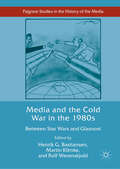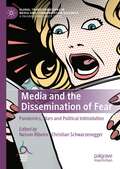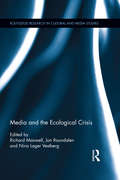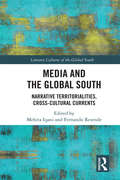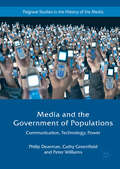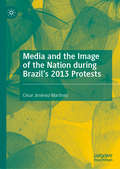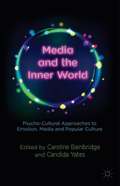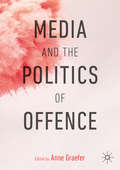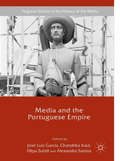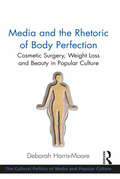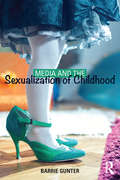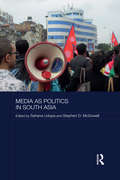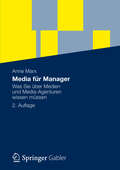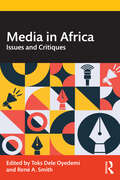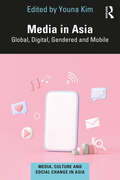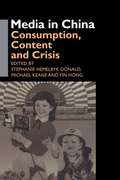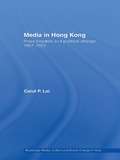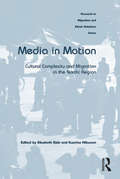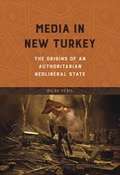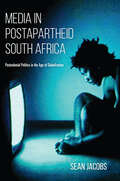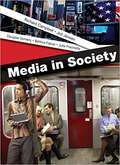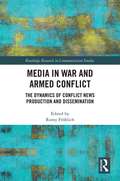- Table View
- List View
Media and the Cold War in the 1980s: Between Star Wars and Glasnost (Palgrave Studies in the History of the Media)
by Martin Klimke Rolf Werenskjold Henrik G. BastiansenThe Cold War was a media phenomenon. It was a daily cultural political struggle for the hearts and minds of ordinary people—and for government leaders, a struggle to undermine their enemies’ ability to control the domestic public sphere. This collection examines how this struggle played out on screen, radio, and in print from the late 1970s through the early 1990s, a time when breaking news stories such as Ronald Reagan’s “Star Wars” program and Mikhail Gorbachev’s policy of glasnost captured the world’s attention. Ranging from the United States to the Soviet Union and China, these essays cover photojournalism on both sides of the Iron Curtain, Polish punk, Norwegian film, Soviet magazines, and more, concluding with a contribution from Stuart Franklin, one of the creators of the iconic “Tank Man” image during the Tiananmen Square protests. By investigating an array of media actors and networks, as well as narrative and visual frames on a local and transnational level, this volume lays the groundwork for writing media into the history of the late Cold War.
Media and the Dissemination of Fear: Pandemics, Wars and Political Intimidation (Global Transformations in Media and Communication Research - A Palgrave and IAMCR Series)
by Christian Schwarzenegger Nelson RibeiroThis book offers a diachronical and inter-/transmedia approach to the relationship of media and fear in a variety of geographical and cultural settings. This allows for an in-depth understanding of the media’s role in pandemics, wars and other crises, as well as in political intimidation. The book assembles chapters from a variety of authors, focusing on the relation between media and fear in the West, the Middle East, the Arab World and China. Besides its geographical and cultural diversity, the volume also takes a long-term perspective, bringing together cases from transforming media environments which span over a century. The book establishes a strong and historically persistent nexus between media and fear, which finds ever-new forms with new media but always follows similar logics.
Media and the Ecological Crisis (Routledge Research in Cultural and Media Studies)
by Richard Maxwell Jon Raundalen Nina Lager VestbergMedia and the Ecological Crisis is a collaborative work of interdisciplinary writers engaged in mapping, understanding and addressing the complex contribution of media to the current ecological crisis. The book is informed by a fusion of scholarly, practitioner, and activist interests to inform, educate, and advocate for real, environmentally sound changes in design, policy, industrial, and consumer practices. Aligned with an emerging area of scholarship devoted to identifying and analysing the material physical links of media technologies, cultural production, and environment, it contributes to the project of greening media studies by raising awareness of media technology’s concrete environmental effects.
Media and the Empire
by Ruth Teer-Tomaselli and Donal P. McCrackenThis volume on print and broadcast media in the 19th and 20th centuries highlights the pivotal role that the media played in the establishment and maintenance of imperial power. The media bolstered both the ideological and financial objectives of the empire in a myriad of overt, covert, and downright scandalous ways. From jeopardising the introduction of wireless telegraphy in order to maximise the financial gains of the investors of under-sea cabling, to newspaper proprietors cashing in on the thrilling, wonderful (and sometimes fabricated) adventures of war correspondents in exotic lands, the media has had a constant background influence in the public’s perception of empire. By covering diverse topics from Anthony Lejeune’s radio talk-show ‘London Letters’ – which supported the Allies by boosting morale and providing a link between soldiers fighting abroad and their families during both World Wars, to the complete subversion of imperial influence – as in the case of the proliferation of diverse media platforms being used by migrant communities in Britain as a means to promote ‘colonization in reverse’, the book hints at the politics, suspense, and intrigue of both the print and broadcast sectors. This book was originally published as a special issue of Critical Arts.
Media and the Global South: Narrative Territorialities, Cross-Cultural Currents (Literary Cultures of the Global South)
by Mehita Iqani Fernando ResendeWhat does the notion of the ‘global south’ mean to media studies today? This book interrogates the possibilities of global thinking from the south in the field of media, communication, and cultural studies. Through lenses of millennial media cultures, it refocuses the praxis of the global south in relation to the established ideas of globalization, development, and conditions of postcoloniality. Bringing together original empirical work from media scholars from across the global south, the volume highlights how contemporary thinking about the region as theoretical framework ・ an emerging area of theory in its own right ・ is incomplete without due consideration being placed on narrative forms, both analogue and digital, traditional and sub-cultural. From news to music cultures, from journalism to visual culture, from screen forms to culture-jamming, the chapters in the volume explore contemporary popular forms of communication as manifested in diverse global south contexts. A significant contribution to cultural theory and communications research, this book will be of interest to scholars and researchers of media and culture studies, literary and critical theory, digital humanities, science and technology studies, and sociology and social anthropology.
Media and the Government of Populations: Communication, Technology And Power (Palgrave Studies in the History of the Media)
by Peter Williams Philip Dearman Cathy GreenfieldThis book deals with the social, cultural and especially political significance of media by shifting from the usual focus on the public sphere and publics and paying attention to populations. It describes key moments where populations of different sorts have been subject to formative and diverse projects of governing, in which communication has been key. It brings together governmentality studies with the study of media practices and communication technologies. Chapters consider print culture and the new political technology of individuals; digital economies as places where populations are formed, known and managed as productive resources; workplaces, schools, clinics and homes as sites of governmental objectives; and how to appropriately link communication technologies and practices with politics. Through these chapters Philip Dearman, Cathy Greenfield and Peter Williams demonstrate the value of considering communication in terms of the government of populations.
Media and the Image of the Nation during Brazil’s 2013 Protests
by César Jiménez-MartínezThis book explores the struggles over the mediated construction and projection of the image of the nation at times of social unrest. Focussing on the June 2013 protests in Brazil, it examines how different actors –authorities, activists, the national media, foreign correspondents– disseminated competing versions of ‘what Brazil was’ during that pivotal episode. The book offers a fresh conceptual approach, supported by media coverage analysis and original interviews, that demonstrates the potential of digital media to challenge power structures and establish new ways of representing the nation. It also highlights the vulnerability of both ‘old’ and ‘new’ media to forms of inequality and disruption due to political interferences, technological constraints, and continuing commercial pressures. Contributing to the study of media and the nation as well as media and social movements, the author throws into sharp relief the profound transformation of mediated nationhood in a digital and global media environment.
Media and the Inner World: Psycho-cultural Approaches to Emotion, Media and Popular Culture
by Caroline Bainbridge Candida YatesThis book applies insights from the spheres of academic scholarship and clinical experience to demonstrate the usefulness of psychoanalysis for developing nuanced and innovative approaches to media and cultural analysis.
Media and the Politics of Offence
by Anne GraeferThis book explores different forms of mediated offence in the context of Trump's America, Brexit Britain, and the rise of far-right movements across the globe. In this political landscape, the so-called ‘right to offend’ is often seen as a legitimate weapon against a ‘political correctness gone mad’ that stifles ‘free speech’. Against the backdrop of these current developments, this book aims to generate a productive dialogue among scholars working in a variety of intellectual disciplines, geographical locations and methodological traditions. The contributors share a concern about the complex and ambiguous nature of offence as well as about the different ways in which this so-called ‘negative affect’ comes to matter in our everyday and socio-political lives. Through a series of instructive case studies of recent media provocations, the authors illustrate how being offended is more than an individual feeling and is, instead, closely tied to political structures and power relations.
Media and the Portuguese Empire
by José Luís Garcia Chandrika Kaul Filipa Subtil Alexandra SantosThis volume offers a new understanding of the role of the media in the Portuguese Empire, shedding light on the interactions between communications, policy, economics, society, culture, and national identities. Based on an interdisciplinary approach, this book comprises studies in journalism, communication, history, literature, sociology, and anthropology, focusing on such diverse subjects as the expansion of the printing press, the development of newspapers and radio, state propaganda in the metropolitan Portugal and the colonies, censorship, and the uses of media by opposition groups. It encourages an understanding of the articulations and tensions between the different groups that participated, willingly or not, in the establishment, maintenance and overthrow of the Portuguese Empire in Angola, Mozambique, S#65533;o Tom#65533; e Pr#65533;ncipe, Cape Verde, Guinea-Bissau, India, and East Timor.
Media and the Rhetoric of Body Perfection: Cosmetic Surgery, Weight Loss and Beauty in Popular Culture (The\cultural Politics Of Media And Popular Culture Ser.)
by Deborah Harris-MooreAgainst the background of the so-called ’obesity epidemic’, Media and the Rhetoric of Body Perfection critically examines the discourses of physical perfection that pervade Western societies, shedding new light on the rhetorical forces behind body anxieties and extreme methods of weight loss and beautification. Drawing on rich interview material with cosmetic surgery patients and offering fresh analyses of various texts from popular culture, including internationally-screened reality-television shows including The Biggest Loser, Extreme Makeover and The Swan as well as entertainment programs and documentaries, this book examines the ways in which Western media capitalize on body anxiety by presenting physical perfection as a moral imperative, while advertising quick and effective transformation methods to erase physical imperfections. With attention to contemporary lines of resistance to standards of thinness and attempts to redefine conceptions of beauty, Media and the Rhetoric of Body Perfection will appeal to scholars and students of popular culture, television, media and cultural studies, as well as the sociology of the body, feminist thought, body transformation and cosmetic surgery.
Media and the Sexualization of Childhood
by Barrie GunterMedia and the Sexualization of Childhood examines the on-going debates surrounding the prominence of sexual themes in children’s lives, from clothes and accessories, toys and games, to music, entertainment media, advertising, and new media platforms. Parents, educators and politicians around the developed world have raised concerns about the effects all these experiences can have on the socialisation and psychological development of children and the extent to which the premature introduction of sexuality into their lives can place them at risk of unwanted attention. This book explores these issues using an evidence based approach that draws on research findings from around the world, representing the most comprehensive single account of the field. The book will be invaluable to students studying topics surrounding children and the media and childhood studies, as well as students of communication, media, cultural studies, sociology, psychology and health science.
Media as Politics in South Asia (Routledge Contemporary South Asia Series)
by Sahana Udupa Stephen D. McDowellThe dramatic expansion of the media and communications sector since the 1990s has brought South Asia on the global scene as a major center for media production and consumption. This book is the first overview of media expansion and its political ramifications in South Asia during these years of economic reforms. From the puzzling liberalization of media under military dictatorship in Pakistan to the brutal killings of journalists in Sri Lanka, and the growing influence of social media in riots and political protests in India, Nepal and Bangladesh, the chapters analyse some of the most important developments in the media fields of contemporary South Asia. Attentive to colonial histories as well as connections within and beyond South Asia in the age of globalization, the chapters combine theoretically grounded studies with original empirical research to unravel the dynamics of media as politics. The chapters are organized around the three frames of participation, control and friction. They bring to the fore the double edged nature of publicity and containment inherent in media, thereby advancing postcolonial perspectives on the massive media transformation underway in South Asia and the global South more broadly. For the first time bringing together the cultural, regulatory and social aspects of media expansion in a single perspective, this interdisciplinary book fills the need for overview and analytical studies on South Asian media.
Media as Politics in South Asia (Routledge Contemporary South Asia Series)
by Sahana Udupa Stephen D. McDowellThe dramatic expansion of the media and communications sector since the 1990s has brought South Asia on the global scene as a major center for media production and consumption. This book is the first overview of media expansion and its political ramifications in South Asia during these years of economic reforms. From the puzzling liberalization of media under military dictatorship in Pakistan to the brutal killings of journalists in Sri Lanka, and the growing influence of social media in riots and political protests in India, Nepal and Bangladesh, the chapters analyse some of the most important developments in the media fields of contemporary South Asia. Attentive to colonial histories as well as connections within and beyond South Asia in the age of globalization, the chapters combine theoretically grounded studies with original empirical research to unravel the dynamics of media as politics. The chapters are organized around the three frames of participation, control and friction. They bring to the fore the double edged nature of publicity and containment inherent in media, thereby advancing postcolonial perspectives on the massive media transformation underway in South Asia and the global South more broadly. For the first time bringing together the cultural, regulatory and social aspects of media expansion in a single perspective, this interdisciplinary book fills the need for overview and analytical studies on South Asian media.
Media für Manager
by Anne MarxDieser praktische Leitfaden hilft Produkt- und Marketingmanagern, gegenüber Media-Anbietern und -Agenturen kompetent und souverän aufzutreten. Sie erfahren, wie Agenturen arbeiten und wie Sie von Ihrer Agentur eine optimale Leistung einfordern, was eine erfolgreiche Media-Planung ausmacht und welche Mediengattungen und Werbeformen Sie kennen sollten. Ein kompakter und verständlicher Überblick über die Media-Basics! Die 2. Auflage wurde aktualisert und die Themen Social Media, Gaming, Mobile Marketing, Digital Retailling, Crossmedia Integration und TV grundlegend neu konzipiert.
Media in Africa: Issues and Critiques
by Toks Dele Oyedemi René A. SmithA comprehensive and accessible introduction, this book examines a range of issues pertaining to theory, history and critiques of media in Africa.Featuring contributions from global scholars, that represent both new and established voices on the African continent and the diaspora, this volume explores themes of decolonization, media freedom, media censorship, identity, representation, pluralism, media framing, political economy of the media with emphasis on ownership, market trends and transnational media operations in Africa. Contributors explore these and other topics across a variety of media tiers, types, genres and platforms. The book also features contributions from practicing journalists and media practitioners working in Africa, providing students with hands-on knowledge from the field. Chapters in this volume take an instructional approach with contributors engaging key concepts and related theories to explore the praxis of media in Africa through specific case studies.An essential text for students of media, communication, journalism, and cultural studies who are studying media in Africa, as well as those studying global media.
Media in Asia: Global, Digital, Gendered and Mobile (Media, Culture and Social Change in Asia)
by Youna KimThis book is an upper-level student source book for contemporary approaches to media studies in Asia, which will appeal across a wide range of social sciences and humanities subjects including media and communication studies, Asian studies, cultural studies, sociology and anthropology. Drawing on a wide range of perspectives from media and communications, sociology, cultural studies, anthropology and Asian studies, it provides an empirically rich and stimulating tour of key areas of study. The book combines theoretical perspectives with grounded case studies in one up-to-date and accessible volume, going beyond the standard Euro-American view of the evolving and complex dynamics of the media today.
Media in Asia: Global, Digital, Gendered and Mobile (Media, Culture and Social Change in Asia)
by Youna KimThis book is an upper-level student source book for contemporary approaches to media studies in Asia, which will appeal across a wide range of social sciences and humanities subjects including media and communication studies, Asian studies, cultural studies, sociology and anthropology. Drawing on a wide range of perspectives from media and communications, sociology, cultural studies, anthropology and Asian studies, it provides an empirically rich and stimulating tour of key areas of study. The book combines theoretical perspectives with grounded case studies in one up-to-date and accessible volume, going beyond the standard Euro-American view of the evolving and complex dynamics of the media today.
Media in China: Consumption, Content and Crisis (Media, Culture And Social Change In Asia Ser.)
by Michael Keane Stephanie Hemelryk Donald Yin HongMultinational media companies increasingly look to China as a highly important market for the future, but with what degree of confidence should they do so? Media in China is about a new kind of revolution in China - a revolution in which rapidly commercializing media industries confront slow-changing power relations between political, social and economic spheres. This interdisciplinary collection draws on the expertise of industry professionals, academic experts and cultural critics. It offers a variety of perspectives on audio-visual industries in the world's largest media market. In particular, the contributors examine television, film, music, commercial and political advertising, and new media such as the internet and multimedia. These essays explore evolving audience demographies, new patterns of media reception in regional centres, and the gradual internationalization of media content and foreign investment in China's broadcasting industries. This book will of use to students and professionals involved in media and communication, as well as anyone interested in contemporary China.
Media in Hong Kong: Press Freedom and Political Change, 1967-2005 (Media, Culture and Social Change in Asia)
by Carol P. LaiThis book examines the Hong Kong media over a forty year period, focusing in particular on how its newspapers and TV stations have struggled for press freedom under the colonial British administration, as well as Chinese rule. Making full use of newly declassified material, extensive interviews and specific case-studies, it provides an illuminating analysis of the dynamics of political power and its relationship with media censorship. Overall, this book is an impressive discussion of the evolving face of the Hong Kong media, and is an important contribution to theoretical debates on the relationship between political power, economics, identity and journalism.
Media in Motion: Cultural Complexity and Migration in the Nordic Region (Research In Migration And Ethnic Relations Ser.)
by Elisabeth EideOwing to increased migration dating from the 1990s, Nordic countries have gone through substantial cultural and social changes, resulting in increased debate surrounding the politics of multiculturalism. One of the central realms of the discussion around multiculturalism in the Nordic region concerns the media, which is considered to be a vital factor in the construction of society's values, as well as an essential tool in the integration process of migrants, providing as it does a symbolic arena for learning about and becoming part of society. This collection draws together the latest research from Denmark, Finland, Norway and Sweden to look at different aspects of the relationship between media and migration in the Nordic region. Exploring the role played by the media in nation building and the power of the media in the definition of who 'belongs' in society, Media in Motion examines the practices of inclusion and exclusion that characterise mainstream media representations. The book also examines the manner in which recent technological changes suggest the emergence of a transnational and cosmopolitan media landscape; a space which blurs the boundaries of the national and transnational, as well as between the public and the private, with significant implications for the ways migrants may take and become part of society. As such, it will be of interest to those working in the fields of media, race and ethnicity, colonialism and postcolonial studies, and migration.
Media in New Turkey: The Origins of an Authoritarian Neoliberal State (The Geopolitics of Information)
by Bilge YesilIn Media in New Turkey, Bilge Yesil unlocks the complexities surrounding and penetrating today's Turkish media. Yesil focuses on a convergence of global and domestic forces that range from the 1980 military coup to globalization's inroads and the recent resurgence of political Islam. Her analysis foregrounds how these and other forces become intertwined, and she uses Turkey's media to unpack the ever-more-complex relationships. Yesil confronts essential questions regarding: the role of the state and military in building the structures that shaped Turkey's media system; media adaptations to ever-shifting contours of political and economic power; how the far-flung economic interests of media conglomerates leave them vulnerable to state pressure; and the ways Turkey's politicized judiciary criminalizes certain speech. Drawing on local knowledge and a wealth of Turkish sources, Yesil provides an engrossing look at the fault lines carved by authoritarianism, tradition, neoliberal reform, and globalization within Turkey's increasingly far-reaching media.
Media in Postapartheid South Africa: Postcolonial Politics in the Age of Globalization
by Sean JacobsA study of mass media in twenty-first-century South Africa offering “revelations about the nature of citizenship and public engagement in our media saturated age” (Daniel R. Magaziner, author of The Law and the Prophets: Black Consciousness in South Africa , 1968–1977).In Media in Postapartheid South Africa, Sean Jacobs turns to media politics and the consumption of media as a way to understand recent political developments in South Africa and their relations with the African continent and the world.Jacobs looks at how mass media define the physical and human geography of the society and what it means for comprehending changing notions of citizenship in postapartheid South Africa. Jacobs claims that the media have unprecedented control over the distribution of public goods, rights claims, and South Africa’s integration into the global political economy in ways that were impossible under the state-controlled media that dominated the apartheid years. Jacobs takes a probing look at television commercials and the representation of South Africans, reality television shows and South African continental expansion, soap operas and postapartheid identity politics, and the internet as a space for reassertions and reconfigurations of identity. As South Africa becomes more integrated into the global economy, Jacobs argues that local media have more weight in shaping how consumers view these products in unexpected and consequential ways.
Media in Society: A Brief Introduction
by Richard Campbell Bettina Fabos Julie Frechette Douglas Gomery Joli JensenCritiquing the mass media, and the role those media play in our lives, requires a critical eye. Media in Society gives students in upper level media courses a unique narrative-based approach to media criticism, exploring the stories media tell—as well as the stories we tell about the media when we describe how it affects us. Organized thematically, Media in Society examines topics like narrative genre, entertainment culture, news, politics, and economics, emphasizing both the pleasures and pitfalls of the media narratives that surround us. Written by an esteemed team of media scholars, specifically for media students, this compact and affordable text makes a great backbone or addition to a media and society course.
Media in War and Armed Conflict: Dynamics of Conflict News Production and Dissemination (Routledge Research in Communication Studies)
by Romy FröhlichThis book focuses on the social process of conflict news production and the emergence of public discourse on war and armed conflict. Its contributions combine qualitative and quantitative approaches through interview studies and computer-assisted content analysis and apply a unique comparative and holistic approach over time, across different cycles of six conflicts in three regions of the world, and across different types of domestic, international and transnational media. In so doing, it explores the roles of public communication through traditional media, social media, strategic communication, and public relations in informing and involving national and international actors in conflict prevention, resolution and peace-keeping. It provides a key point of reference for creative, innovative, and state-of-the-art empirical research on media and armed conflict.
